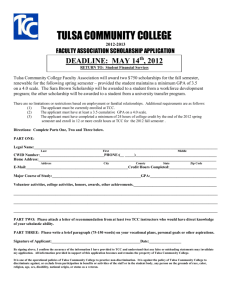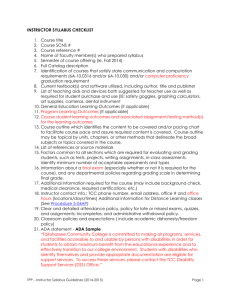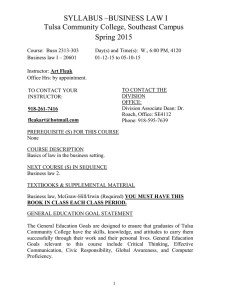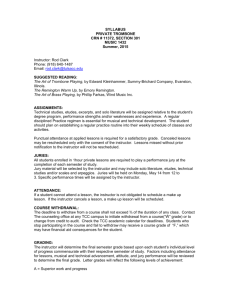Course: - Blackboard Learn
advertisement
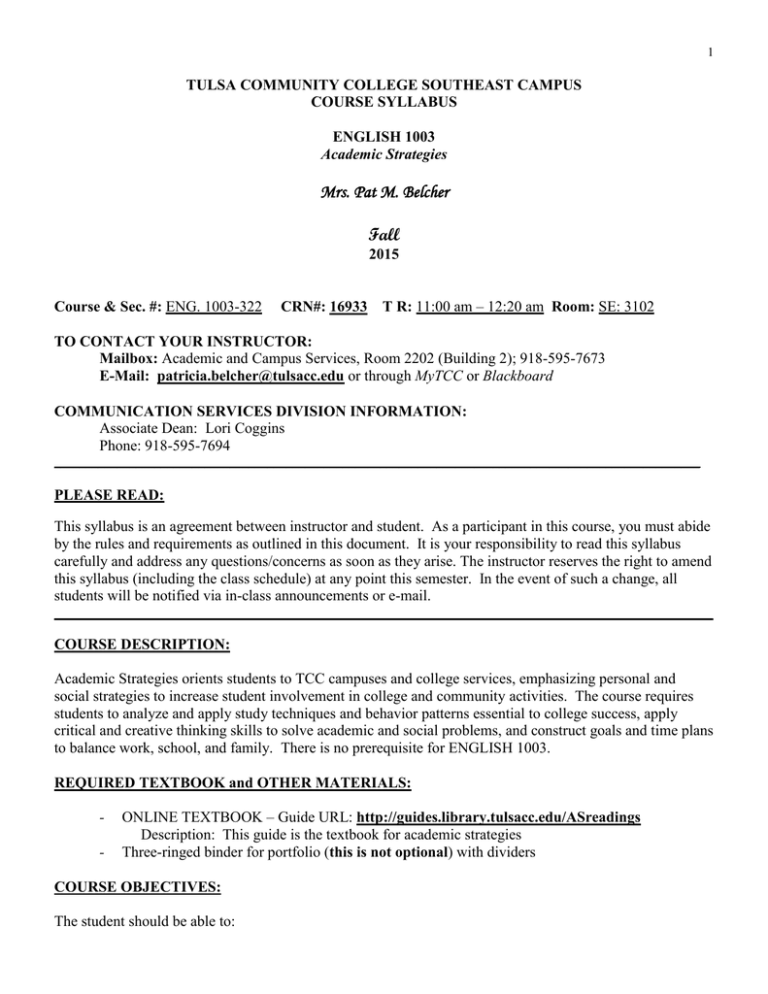
1 TULSA COMMUNITY COLLEGE SOUTHEAST CAMPUS COURSE SYLLABUS ENGLISH 1003 Academic Strategies Mrs. Pat M. Belcher Fall 2015 Course & Sec. #: ENG. 1003-322 CRN#: 16933 T R: 11:00 am – 12:20 am Room: SE: 3102 TO CONTACT YOUR INSTRUCTOR: Mailbox: Academic and Campus Services, Room 2202 (Building 2); 918-595-7673 E-Mail: patricia.belcher@tulsacc.edu or through MyTCC or Blackboard COMMUNICATION SERVICES DIVISION INFORMATION: Associate Dean: Lori Coggins Phone: 918-595-7694 _______________________________________________________________________________________________________ PLEASE READ: This syllabus is an agreement between instructor and student. As a participant in this course, you must abide by the rules and requirements as outlined in this document. It is your responsibility to read this syllabus carefully and address any questions/concerns as soon as they arise. The instructor reserves the right to amend this syllabus (including the class schedule) at any point this semester. In the event of such a change, all students will be notified via in-class announcements or e-mail. ___________________________________________________________________________ COURSE DESCRIPTION: Academic Strategies orients students to TCC campuses and college services, emphasizing personal and social strategies to increase student involvement in college and community activities. The course requires students to analyze and apply study techniques and behavior patterns essential to college success, apply critical and creative thinking skills to solve academic and social problems, and construct goals and time plans to balance work, school, and family. There is no prerequisite for ENGLISH 1003. REQUIRED TEXTBOOK and OTHER MATERIALS: - ONLINE TEXTBOOK – Guide URL: http://guides.library.tulsacc.edu/ASreadings Description: This guide is the textbook for academic strategies Three-ringed binder for portfolio (this is not optional) with dividers COURSE OBJECTIVES: The student should be able to: 2 1. Use personal and social strategies to succeed in and enjoy the college experience and to become involved in college and community activities; 2. Identify and apply college and academic terminology; 3. Construct short-term and long-term goals, balancing personal skills, interests, personality, and values; 4. Construct and monitor weekly/monthly time plans to balance work, school, family, and social activities; 5. Locate and apply college resources and support systems and incorporate these into the learning process (MyTCC Portal, Blackboard, Career Center, Advisement, Financial Aid, Learning Resource Center, Computer Labs, and Support Labs); 6. Analyze and modify study techniques and behavior patterns to successfully complete homework, reading assignments, exams, and special projects: ~ Demonstrate effective note taking techniques across the disciplines; ~ Demonstrate test taking strategies for objective tests, essay exams, and oral examinations; ~ Use techniques for improving memory and concentration; 7. Apply critical and creative thinking skills to identify and solve academic and social problems (includes math and science strategies, information literacy techniques, collaborative learning, diversity issues, and conflict resolution); 8. Apply writing process skills to written work: ~ Demonstrate application of basic paragraph and essay organizational techniques; ~ Use mechanics of English correctly (i.e. grammar, punctuation, and spelling); 9. Demonstrate transference of skills learned to other coursework during the semester. To make the course objectives applicable to your life, Learning Outcomes are listed below. These outcomes are specific tasks and/or processes students will complete in this course over the semester. You may use the table of Learning Outcomes as a checklist, indicating tasks that have been completed. LEARNING OUTCOMES (TASKS YOU WILL PERFORM IN THIS COURSE): Orientation to College Campus and Services By the completion of this course students will: Locate a majority of the student services, including Registration, Financial Aid, Advisement, the Library, Student Activities, the Fitness Center, the Book store, Campus Police, Student Computer Labs, Career Planning Services, Writing Center Tutors, Math Tutors, student Government, and Academic and Campus Services. Use at least five of the student support systems listed above. Complete Educational Planning Unit. Technology By the completion of this course students will: Access TCCNet. Download and upload assignments in Blackboard. Use the Discussion Board in Blackboard. Send and receive emails from their TCC Outlook email address. Be able to enroll in classes and to print their semester schedules. Type a document in MLA style using Microsoft Office Word. Effective Communication By the completion of this course students will: Construct emails to faculty and peers using formatting, language, and grammar/mechanics appropriate in professional correspondence. 3 Present a clear and valid discussion point and support it with evidence in a short answer or essay question on an exam. Exercise classroom etiquette in classroom interactions with professors and other students. Goal Setting and Time Management By the completion of this course students will be able to: Set long term goals in various categories (education, family, career, personal health, community, and/or self-actualization). Establish semester education goals for this course. Construct a weekly plan that balances work, school, personal goals, and family (as appropriate). Schedules include time blocked for homework, work, travel, exercise, family obligations, household chores, personal errands, community commitments, personal growth and leisure activities (short term goals). Complete the Career Planning Unit, analyzing at least one possible career choice. Critical Thinking and Academic Development By the completion of this course students will: Create a semester crisis plan to address problems that typically arise during a semester, including transportation issues, severe illness, family emergencies, job conflicts, and lost books/notes. Demonstrate effective note taking from other courses or guest presentations/workshops. Complete a Library Information Literacy Unit and/or Plagiarism Review. Complete a study guide for an exam. Demonstrate ability to apply levels of critical thinking to a self-analysis of test performance. Follow critical reading processes for textbook readings and literary text readings. Develop a working plan to resolve problems using steps to create and analyze options and execute a plan. Civic Responsibility and Diversity in Community By the completion of this course students will: Contribute at least 5-8 hours community service (perimeters set at discretion of instructor). Resolve social conflicts in a variety of scenarios through role-playing. Participate in a student organization or Student Activities function GRADE DISTRIBUTION: The final grade for this course will be based on the following scale. Students may check their progress at any point this semester by reviewing the “student grades” section on the class Blackboard page. There will NOT be any extra credit assignments this semester, so all students are strongly encouraged to maintain a strong academic effort throughout the course. 925 - 832 points 831 - 740 points 739 - 647 points 646 - 555 points 554 and below A B C D F Points are awarded based on the following class activities: Essay #1 (2 page minimum) Essay #2 (2 page minimum) Exam #1 (mid-term) 50 points 50 points 100 points 4 Exam #2 (final exam) Classroom Activities Portfolio Vision Board Time Management Advisement Assignment Library Unit 100 points 200 points 150 points 50 points 100 points 25 points 100 points TEACHING METHODS: This class will be conducted as an academic support group for students and as a workshop consisting of brief lectures, discussions, group activities, individual activities, learning experiences, and portfolio assessment. ATTENDANCE: Students are expected to attend class regularly and to be on time. However, there is no documented or enforced attendance policy. Each and every class meeting is important, and student participation is a vital ingredient to success this semester. Excessive absence makes successful completion of the class difficult or impossible. Any student who is frequently absent from this course should not expect a passing grade. After an absence, the student is responsible for obtaining their assignments and classroom materials from another student. Most in-class assignments cannot be made up; participation and class activity points cannot be made-up. Weekly assignments will not be accepted after the due date. No major assignments (midterm and final exams, portfolio, essays, etc.) will be accepted after the due date without instructor approval on or before the due date. Approved make-up work must be submitted in a timely manner – within a week from the time the student is able to return to class. LATE WORK/MAKE-UP WORK: All students are expected to submit their work on-time and in the manner designated by the instructor. Since all major assignments deadlines are outlined in this syllabus, there is no reason for any late submissions. Therefore, any assignment submitted past the prescribed deadline will not be graded/accepted. As with the attendance policy, any student who misses a deadline due to a medical or family emergency many be granted a brief extension (the time allotted is dependent on the circumstances). CLASSROOM ADMISSION: Access to the classroom is limited only to students who are officially enrolled in the course and are recognized as such in the Tulsa Community College database. No guests, family members, friends, or children will be admitted. Also, in accordance with campus procedure, the class door will be locked once our session begins. Any student who arrives after the door is closed must knock for admission and confirm that their attendance is recorded. CLASSROOM ETIQUETTE: Open and mutually respectful communication of varied opinions, beliefs, and perspectives during classroom or online discussion encourages the free exchange of ideas that is essential to higher learning and to the ability to learn from each other. Any student determined to be disruptive will be asked to leave the class. They will forfeit any credit for the session and be charged with an absence. During this class, there will be many opportunities for discussion about various topics. Any debates or confrontations should remain civil and logical. Also, mocking another student’s ideas, speech, appearance, or compositions will not be 5 tolerated. Anyone found making rude comments or gestures toward another student will be warned the first time then penalized a full (final) letter grade for every following offense. The instructor may also contact the Dean of Student Services with a recommendation for further disciplinary action. WITHDRAWAL PROCEDURES: The student who simply stops attending class has not officially withdrawn. If a student cannot continue with a class, he or she must officially withdraw. The last day to withdraw is Friday, November 6, 2015. Procedures for withdrawal are: 1. You are required to begin the process by talking with your instructor. There are other options open to students besides withdrawal. Always include the professor in the decision process. 2. Begin the paperwork process in Advisement which is located on the first floor of Building 2. The advisement staff will walk you through the proper procedure for withdrawal from a course. 3. Keep a copy of the withdrawal form for your records. Withdrawal and/or change to an audit from a course after the drop/add period can alter the financial aid award for the current and future semesters. Students may receive an outstanding bill from TCC if the recalculation leaves a balance due to TCC. Students who stop participating in the course and fail to withdraw may receive a course grade of “F”, which may have financial aid consequences. POLICY REGARDING ELECTRONIC DEVICES: All cell phones, laptops, and other electronic devices should be turned off. If any student is expecting an emergency phone call, please notify the instructor before class and set the phone to silent. Also, please find a seat near the door and exit the room quietly. E-MAIL: All communications from the instructor and the college will be sent exclusively to the student’s assigned TCC address. After enrollment, all TCC students receive a designated e-mail address. All students are required to regularly check their e-mail and use it to correspond with the instructor outside of class. If any student is not familiar with their address, they are encouraged to contact the TCC Help Desk as soon as possible at 918-595-2000. CONTACTING THE INSTRUCTOR: The best way to reach the instructor is via e-mail communication. While some messages are answered shortly after their submission, please allow at least forty-eight (48) hours for a response. All students MUST use their official TCC e-mail when communicating with the instructor. Personal e-mail addresses are not accepted. Unless otherwise noted, the instructor will not respond to e-mail messages on the weekends. WRITING CENTER/MATH LAB: Assistance in reading, writing, and study skills is available in the Writing Center (Room 1102). Assistance in mathematics and individualized tutoring for math courses is available in the Math Lab. INCLEMENT WEATHER: TCC rarely closes. If extreme weather conditions or emergency situations arise, TCC always gives cancellation notices to radio and television stations. This information is also posted on the TCC website (www.tulsacc.edu). 6 TOBACCO FREE COLLEGE: Tulsa Community College prohibits smoking or the use of tobacco products on all property owned, leased or contracted for use by Tulsa Community College. This includes both indoor and outdoor areas such as, but not limited to, classrooms, laboratories, offices, work areas, vestibules, hallways, enclosed walkways, restrooms, elevators, stairwells, sidewalks, parking lots, and green spaces, etc. This policy also includes vehicles owned, leased, or rented for College business. The prohibition includes, but is not limited to, cigarettes, cigars, chewing tobacco, pipes, hookahs, ecigarettes, dip, snuff, smokeless pouches, or any form of loose leaf or rolled tobacco. Legal Reference: Oklahoma State Statute, Title 21, Section 1247 Oklahoma Governor Executive Order 2012-01 Oklahoma State Statute, Title 63, Section 1-1523 GENERAL EDUCATION GOALS: Tulsa Community College graduates value cultural diversity, ethical behavior, and the unique role of public education in sustaining a free society. The following general education goals function independently and in concert. TCC graduates demonstrate: 1. Communication Skills – effective written, oral, visual, technological, and interpersonal interactions. 2. Critical Thinking – aesthetic and qualitative reasoning for creative inquiry, analysis, synthesis, and evaluation or information, both abstract and concrete. 3. Empirical Skills – problem solving and quantitative reasoning in support of scientific and mathematical concepts. 4. Teamwork – the ability to collaborate in support of shared purposes and goals. 5. Personal Responsibility – choices and actions that recognize consequences and exhibit ethical decision-making. 6. Social Responsibility – the ability to evaluate one’s own ethics and traditions in relation to others and to embrace the diversity of human experience while engaging local, regional, and global communities. SYLLABUS CHANGES: Occasionally, changes to the syllabus may be necessary. Students will be notified of any changes to the syllabus during class time or via e-mail. DISABILITY RESOURCES: It is the policy and practice of Tulsa Community College to create inclusive learning environments. Accommodations for qualifying students in compliance with the Americans with Disabilities Act (ADA) and Section 504 of the Rehabilitation Act are available. To request accommodations, contact the Education Access Center (EAC) at eac@tulsacc.edu or call (918) 595-7115 (Voice). Deaf and hard of hearing students may text (918) 809-1864. 7 ACADEMIC MISCONDUCT POLICY: Academic dishonesty (cheating) is defined as the deception of others about one’s own work or about the work of another. Academic dishonesty or misconduct is not condoned or tolerated at campuses within the Tulsa Community College system. Tulsa Community College adopts a policy delegating certain forms of authority for disciplinary action to the faculty. Such disciplinary actions delegated to the faculty include, but are not limited to, the dismissal of disrespectful or disorderly students from classes. In the case of academic dishonesty a faculty member may: Require the student to redo an assignment or test, or require the student to complete a substitute assignment or test; Record a "zero" for the assignment or test in question; Recommend to the student that the student withdraw from the class, or administratively withdraw the student from the class; Record a grade of "F" for the student at the end of the semester. Faculty may request that disciplinary action be taken against a student at the administrative level by submitting such a request to the Dean of Student Services. COURSE DROP OR WITHDRAWAL: A student who has been found responsible for academic dishonesty in a course may not drop or withdraw from the course. If the student processes a drop or withdrawal from the course, the action will be reversed and the appropriate grade will be recorded on the student's transcript. PLAGIARISM STATEMENT: Plagiarism is claiming, indicating, or implying that the words, ideas, or sentences of another writer are your own; copying the work of another and presenting it as your own; or following the work of another as a guide to ideas and expression that are then presented as your own. Students who turn in the same work will both be considered to have plagiarized. For more information, please read either pages 626-635 in The Little, Brown Handbook, or pages 191-195 in The Craft of Research. INSTITUTIONAL STATEMENT: Each student is responsible for being aware of the information contained in the TCC Catalog, the TCC Student Policies & Resources Handbook, and semester information listed in the class schedule. All information may be viewed on the TCC website: www.tulsacc.edu PORTFOLIO GRADING: An Academic Portfolio of the student’s coursework, worth 150 points of the final grade, will be submitted once at the end of the semester. Portfolio assessment enables students to document mastery of the objectives by presenting evidence of the course outcomes of the semester. The Portfolio will provide students with an individualized academic reference to be used throughout their college experience - - the result of their research and assessment of academic strategies and support services. Students will participate in many learning activities and writing exercises - - individual and group, graded and ungraded. Students are advised to keep all written exercises, revisions, worksheets, and handouts from the course. Since the loss or damage of the course materials could jeopardize the Portfolio grade, course materials should be maintained with care. 8 TENTATIVE COURSE CALENDAR: Please note that the instructor reserves the right to amend this schedule at any point this semester. In the event of such a change, all students will be notified via in-class announcements and/or MyTCC e-mail messages. Week 1 –August 18 and 20 Course Introductions Syllabus Discussion/Syllabus Activity Read: Unit I: About TCC and Technology 1.1 Introduction to the College – Read all sections (examples below) Sec. 1 - Barry Zimmerman Article Sec. 2 - Phases and Processes of Self-Regulation Sec. 3 - College Definitions Sec. 4 - Intro. to MyTCC and Single Sign On Sec. 5 - Preparing for Emergencies Sec. 6 - Exercise: Making a Crisis Plan Week 2 –August 25 and 27 (meet in Computer Lab 1220 both days) Read: Unit I 1.2 TCC Facilities and Support Services 1.3 Advisement Using a College Catalog Activity 1.4 Career Planning College Definitions Hand-Out Assignment: Zimmerman Group Presentations – due 9-8-15 Assignment: PORTFOLIO due 11-17-15 Week 3 – September 1 and 3 Campus Scavenger Hunt Academic First Impressions Tell Us About Yourself . . . Crisis Plan Activity Work in groups on Zimmerman Assignment Assignment: Essay # 1 – due 9-22-15 Prompt – Discuss some of the obstacles or problems that have kept you from success either in school or real life. How did you overcome these obstacles? If you weren’t able to overcome these problems, what would you think to do differently now? Why did you choose this path for college? What led you to TCC? What skills discussed/learned in this class have influenced you the most so far? What skills have you used in other classes? Week 4 – September 8 and 10 Present Zimmerman Assignment Read: Unit 2: Goals and Time Management 2.1 Goal Setting Activities: Wildest Dreams Establishing Life Goals/Long-term Goals/ Semester Goals How to Write Goals/Analyze Goals 9 Goal Setting Assignment: Vision Board – due 9-17-15 Week 5 – September 15 and 17 Read: Unit 2 2.2 Time and Stress Management Activities: Creating a Time Management System Coping with Stress Assignment: Time Management – due 10-27-15 2.3 Money Management Activity: Creating a Budget Present Vision Boards to class Week 6 – September 22 and 24 Assignment Due: Essay #1 due 9-22-15 Read: Unit 3: Study Skills 3.1 Learning Styles Activities: Learning Styles Survey Reflecting on Learning Style Preferences Assignment: Learning Theories (if time permits) 3.2 Reading Activities: SQ3R Drawing Conclusions How to Use Your Textbook Reading Difficult Material Listening Skills Week 7 – September 29 and October 1 (Meet in Computer Lab #1220 both days) Read: Unit 3 3.3 Note Taking Activities: Note taking in another class Note taking during videos Note taking skills Watch note taking videos Review for Mid-term Week 8 – October 6 and 8 Mid-term Exam Review Mid-term Exam Week 9 – October 13 and 15 Read: Unit 3 3.4 Test Taking Activities: Test preparation Strategies for different types of tests Watch test taking videos Test anxiety 3.6 Math Study Skills Activities: How to be successful in math Math anxiety 10 Week 10 – October 20 and 22 Read: Unit 4: Critical Thinking 4.1 Memory Activities: Memory Aids Exercise Improving Your Memory Techniques 4.2 Critical Thinking Tools Activities: Bloom’s Taxonomy Critical Thinking Exercises Week 11 – October 27 and 29 Continue with Critical Thinking Exercises Assignment: Essay #2 – due 11-24-15 Prompt – Discuss the college major that you have chosen (at this time) and your career choice. Why did you choose this major/career? List and discuss reasons for both. What steps do you need to take in order to meet your goals? What steps are necessary for achieving success in your life? Week 12 – November 3 and 5 Read: Unit 4 4.3 Community and Diversity Activities: “A Class Divided” video “What Would You Do” video Cultural Diversity Worksheet The Choice – values exercise Presenting Diversity – writing activity 4.4 Teambuilding and Leadership Activities: Teamwork discussion 4.5 Conflict Resolution Activities: Resolving conflicts – videos Conflict Resolution and Problem Solving workshop Tips for resolving conflicts Week 13 – November 10 and 12 (Meet in Library) Read: Unit 1 1.3 Advisement Activities: Student Advisement Worksheet Choosing a Major Assignment: Visit with your Academic Advisor Enrollment Form due 11-24-15 Nov. 12 – Meet in Library for Library Assignment Instruction Week 14 – November 17 (meet in Computer Lab #1220) and 19 Read and work on: Unit 5 5.1 – Library Introduction 5.2 – Library Resources 5.3 – Be an Info Pro PORTFOLIO DUE 11-17-15 11 Week 15 – November 24 (Meet in Computer Lab #1220) and 26 (Thanksgiving – no class on the 26th) ESSAY #2 DUE ON 11-24-15 Activity: Review for Final Exam Week 16 – December 1 (Meet in Computer Lab #1220) and 3 (NO CLASS) Activity: Work on Review for Final Exam on 12-1-15 No class on 12-3-15 – Review for final exams Week 17 – FINAL EXAM THURSDAY, DECEMBER 11, 2015 11:00 AM – 12:50 AM


